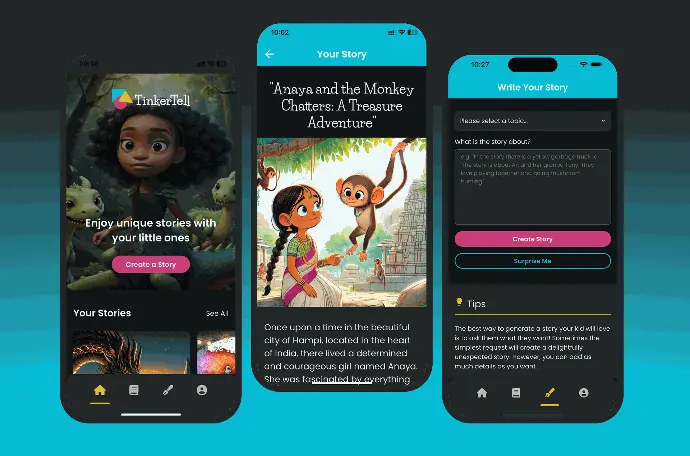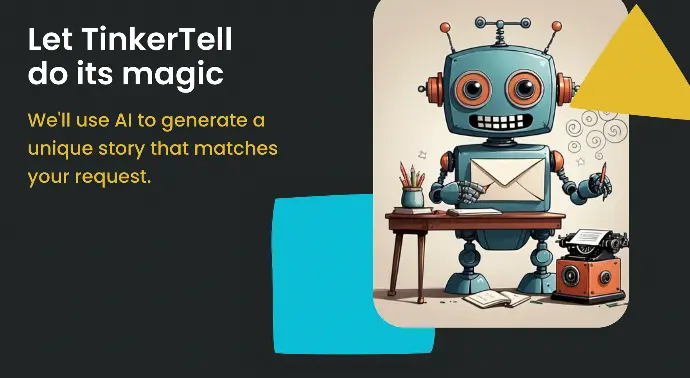ID: Two White women sitting in front of a green and blue leaf print wall in grey chairs. The woman on the left is wearing a teal V-neck sweater and the woman on the right is wearing a white sweater with zebra print sleeves.
As the CEO and founder of THENCE, I was very happy in 2024 to announce a new partnership with TinkerTell, which is an AI powered storytelling app led by CEO Arianna Marsilio (photo caption: Arianna Marsilio, left, in conversation with Katherine Schlatter in Lisbon, Portugal at Web Summit November 2024)
THENCE collaborates with TinkerTell on several fronts. Together we have adopted an ecosystem approach to study users as they explore how narrative storytelling may serve to develop spoken language and literacy skills. We asked parents, care-givers, teachers, and even therapists, to co-create fun, creative, and engaging narratives based on a child's wishes, plus whatever else the moment demanded. We found that the app positions caregiver to read aloud to the child(ren) under their care. Users give feedback on the generated story's quality and relevance, which has already vastly improved the app's performance. Other insights we gained answered some but not all the questions we have.

TinkerTell
The app is available on the Google Play and Apple stores, for information on becoming a beta tester, reach us via the form below.
ID: On the left is three phone screens depicting different parts of the TinkerTell app: the home screen, a story with cover art, and the screen in which prompts are written. The right side reads "TinkerTell, the app is available on the Google Play and Apple stores, for information on becoming a beta tester, reach us via the form below."
What are the advantages of a highly user-friendly AI-powered app over a general LLM?
The advantage of TinkerTell versus a general LLM like ChatGPT are numerous. From the start Marsilio, worked hard to make TinkerTell's user experience seamless. Users give story prompts in two steps and the output arrives in under a minute. "Basically, we have very little friction, and most users find it highly intuitive." She explains.
Some of the early technical successes have also been due to the machine learning wizardry, and the technical team's iterative approach. Safety and security have also been prioritized by CTO and Co-founder Rob Pellegrini.
Early on Marsilio adopted a mission-driven approach. She made the storytelling app focus on development and affordability. Users can generate up to three stories per month for free. If they want more stories, they can always subscribe for a nominal fee of $3 a month.
A story
and a pic
When prompted the app generates a story plus one picture that matches the story.

ID: The left side reads, "A story and a pic, when prompted the app generates a story plus one picture that matches the story. The right side in smaller font next to a robot working at a desk in between a mustard triangle and cerulean square reads, "Let TinkerTell do its magic, we'll use AI to generate a unique story that matches your request."
"Those free stories might inspire a family to keep working on their narratives with or without the app's assistance" says Marsilio. "Even if they work offline with their narratives we have accomplished something good." She adds.
An educator's subscription package will soon be available with listening and reading comprehension tools, as well as a print function. All of these features have performed well in beta testing.
Why is "read aloud" time so important?
When children are read to regularly, the cumulative effect of this experience can be quite compelling: Children who hear five short books a day on average, have heard about 1.4 million more words by age five years, than children who rarely have such an experienced.
It's not just hearing words that encourages early language development. Importantly, it's the fact that these words come in the context of a narrative with story elements such as character, plot, emotions, revelations, and events. The child's early cognitive faculties are stretched to make sense of these elements as they relate to the progress of a story.
The app not only encourages caregivers to read aloud to their little ones, early evidence shows that it encourages children to ask for more stories to be read aloud. This most likely has a positive effect on how frequently parents read to their children. We suspect there are more measurable benefits, the data hints at deep gains in children's desire to hear stories in the 2-6 year range.

A listening comprehension feature
"Right now we don't score the the answer..." explains Marsilio. Instead it offers answers to think with, which is "...part of the metacognitive design".
ID: The left reads, "A listening comprehension feature. Right now we don't score the answer...explains Marsilio. Instead it offers answers to think with, which is...part of the metacognitive design." The right depicts a cell phone with TinkerTell discussion questions and answers in front of a mustard yellow background.
Does TinkerTell support PCRQ, and what is that anyway?
Time spent together reading is a calm activity with the potential for rich interaction between a caregiver and a child. It is also a crucial type of text to spoken interaction that supports skills needed for language development before a child is taught skills like phonetics, site words, and other reading strategies.
As a developmental psychologist I always explain how shared reading creates a wonderful opportunity for "joint attention", defined as the shared focus on an object (the story) by two individuals (parent and child). As a parent I treasure the moments of tenderness that feed our emotional connection, which is part of the the "parent-child relationship quality" or PCRQ, the metric used by developmental psychologists in parenting research.
We can anticipate why high PCRQ increases when there is frequent and rich joint attention on a story. Indeed we know that stories can intrigue, delight and challenge us in ways that are reflectively fun whilst also maintaining concentration. High PCRQ during childhood is associated with better mental health outcomes in adulthood. TinkerTell provides opportunities for building PCRQ due to the novelty of designing stories together where characters and plot may reflect the child's life and family, and even troubleshooting challenges, like minor fears and anxieties.
Do TinkerTell stories replace reading from books?
I put this question to Marsilio at the very start of our collaboration. I admit it was a loaded question. And I was asking it because I needed to know how the CEO thought about books. Disclosure: my family loves books, gifting books is our love language (see my personal take on this below).
Marisilio does not see TinkerTell as replacing books. Marsilio is a new mom and whilst her child is only a toddler she was recently surprised by how even at a very young age physical books intrigue and inspire. In field research with TinkerTell more than one family reported how the app maybe encouraging longer periods of child-directed book requests for read aloud time. Another family reported how the TinkerTell app limited mindless screen time during the boring intervals of everyday routines.
Books are our love language
"In our family books are given on birthdays, on holidays, and on ordinary days to celebrate life. We have been fortunate to live in cities with great libraries and many independent bookstores within walking distance.Eighteen years into my parenting journey, I have a very extensive home library filled with children's' literature representing so many categories, developmental ages, and genres. Our children's' shelves bulge with book series that tell a story about who they are, and what was important to them at different ages. As children grow up, the physical book remains important to them for many reasons. For one, books become artifactual objects, with dog-eared pages, notes and drawings in the margins. The books hold meaning, memories, and clues about their own developmental trajectory."
Katherine Schlatter
ID: In white against a black background reads, "Books are our love language: "In our family books are given on birthdays, on holidays, and on ordinary days to celebrate life. We have been fortunate to live in cities with great libraries and many independent bookstores within walking distance. Eighteen years into my parenting journey, I have a very extensive home library filled with children's' literature representing so many categories, developmental ages, and genres. Our children's' shelves bulge with book series that tell a story about who they are, and what was important to them at different ages. As children grow up, the physical book remains important to them for many reasons. For one, books become artifactual objects, with dog-eared pages, notes and drawings in the margins. The books hold meaning, memories, and clues about their own developmental trajectory." - Katherine Schlatter
TinkerTell for coping in book-less situations
In book-less scenarios, for example when a child is bored in the car, or in the waiting room of a dentist's office, requesting and reading a custom story can offer a social and emotional boost. Recently a mom reported that fear over waiting for a X-ray was turned into triumphant narrative with the help of TinkerTell. We can speculate that created-in-the-moment narratives are particularly engaging and reflect what a child wants to overcome in the present.
There's no doubt that TinkerTell thus also creates a major opportunity for children who often do not see themselves represented in a way they see fit. Indeed children can describe themselves, and get a story with a picture that may resemble their need for representation. But here we have still identified some caveats and planned work. General LLMs are prone to surfacing propensities toward stereotypes, if not the whole unwelcome stereotype. Thus THENCE and TinkerTell have worked to address outputs that might contained subtle, and not-so-subtle cues that perpetuate certain legacies in writing and illustrating traditions. One that front TinkerTell and THENCE hold complementary teams with expertise in both machine learning, anthropology, anti-bias training, diversity, equity and inclusion. We come together to discuss specific challenges and how they can be eliminated or mitigated.
TinkerTell is about safety first
Most importantly TinkerTell is a safe and secure space, because rigorous pass fail algorithms prevent the dangers that general LLMs pose. There's even a new feature to request a story for toddlers, this Holiday season. This feature brings a simpler story, delivering it at a faster pace. Some recent demos brought fresh interest in TinkerTell as this high potential startup offers pre-seed opportunities for angels, family offices and VCs. An EdTech company and two publishers have requested time with TinkerTell for potential future collaborations as well. All these indicators show that the company that owns TinkerTell, called 'Tink Big" is indeed adding value -- and doing just that -- thinking bigger and bigger!